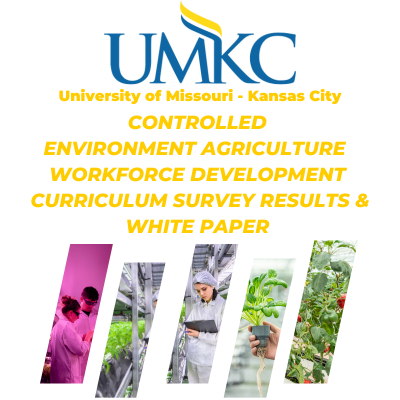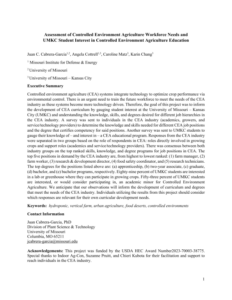
White Paper: Assessment of CEA Workforce Needs and UMKC Student Interest in CEA Education

Indoor Ag-Con Academic Ally University of Missouri – Kansas City (UMKC)’s Dr. Juan Cabrera-Garcia, Dr. Angela Cottrell and their team conducted a survey accessing controlled environment agriculture workforce needs and expectations for future educational programming to attract and train student to enter the sector. Dr. Cottrell shared some of the survey findings during a workforce development panel discussion at Indoor Ag-Con 2023 and she and the team authored a white paper on the findings as well. We are pleased to share that presentation here along with a corresponding white paper on their findings.
EXECUTIVE SUMMARY
Controlled environment agriculture (CEA) systems integrate technology to optimize crop performance via environmental control. There is an urgent need to train the future workforce to meet the needs of the CEA industry as these systems become more technology driven. Therefore, the goal of this project was to inform the development of CEA curriculum by gauging student interest at the University of Missouri – Kansas City (UMKC) and understanding the knowledge, skills, and degrees desired for different job hierarchies in the CEA industry.

A survey was sent to individuals in the CEA industry (academics, growers, and service/technology providers) to determine the knowledge and skills needed for different CEA job positions and the degree that certifies competency for said positions. Another survey was sent to UMKC students to gauge their knowledge of – and interest in – a CEA educational program. Responses from the CEA industry were separated in two groups based on the role of respondents in CEA: roles directly involved in growing crops and support roles (academics and service/technology providers).
There was consensus between both industry groups on the top ranked skills, knowledge, and degree programs for job positions in CEA. The top five positions in demand by the CEA industry are, from highest to lowest ranked: (1) farm manager, (2) farm worker, (3) research & development director, (4) food safety coordinator, and (5) research technicians. The top degrees for the positions listed above are: (a) apprenticeship, (b) two-year associate, (c) graduate,(d) bachelor, and (e) bachelor programs, respectively.
Eighty-nine percent of UMKC students are interested in a lab or greenhouse where they can participate in growing crops. Fifty-three percent of UMKC students are interested, or would consider participating in, an academic minor for Controlled Environment Agriculture. We anticipate that our observations will inform the development of curriculum and degrees that meet the needs of the CEA industry.
Individuals utilizing the results from this project should consider which responses are relevant for their own curricular development needs.
Contact Information
Juan Cabrera-Garcia, PhD
Division of Plant Science & Technology University of Missouri
Columbia, MO 65211 jcabrera-garcia@missouri.edu
Acknowledgements: This project was funded by the USDA HEC Award Number2023-70003-38775. Special thanks to Indoor Ag-Con, Suzanne Pruitt, and Chieri Kubota for their facilitation and support to reach individuals in the CEA industry
controlled environment agriculture, food deserts, Hydroponic, urban agriculture, Vertical farm